There’s an uncomfortable fact about covert operations in the information-saturated modern world. Like personal WhatsApp messages, they always leak — the only questions are how long it takes, who leaks, and what the consequences will be.
With reports coming from both Washington and Berlin that Ukrainians may have been behind the spectacular bombings of the Nord Stream gas pipeline back in September, it looks as if the current lag is just months.
At the time, the mysterious attacks were variously blamed on Moscow, Kyiv, Washington, London and who knows who else. The quandary was that it was hard to see who would benefit. The pipelines were inactive, and there seemed little prospect of them ever being used, as Europe in general and Germany in particular weaned itself off Russian gas. The Americans had made intemperate statements that “one way or another” the new Nord Stream 2 pipelines would not open if Russia invaded Ukraine. But the political cost of America bombing a pipeline that even Berlin was already saying it would not use seemed massively disproportionate, and Seymour Hersh’s recent claims to this effect have been comprehensively debunked.
Let me hold up my hands here: at the time, I thought the Russians the likely culprits. They certainly have the capacity to attack underwater pipes and cables and this looked like a gesture to demonstrate that capacity and the will to use it, but in a safe way. After all, no one could get that aggrieved about Russia cutting their own pipelines, which were already essentially useless.
;768:[300×250,336×280,320×100];0:[300×250,320×100,320×50]”]Now we have a blockbuster report in the New York Times that paints a very different picture. While one may have some skepticism about some of the US intelligence community’s selective and strategic leaks (and the New York Times’s willingness to be their loyal amanuensis), the claim that while “there was much they did not know about the perpetrators and their affiliations,” it seemed to be “a pro-Ukrainian group” not apparently directly linked to Kyiv, is pretty unambiguous.
Besides, Die Zeit has separately claimed that German investigators have reached the conclusion that the attack was carried out by a team of six people, including a couple of specialist divers, operating from a yacht hired by a company registered in Poland yet owned by two Ukrainians.
On the one hand, this sounds more like the treatment for a new blockbuster movie, especially implausible given the level of expertise necessary. Though if, as some suggest, the operation was bankrolled by a Ukrainian oligarch, he could presumably afford to hire the best. On the other hand though, it does make sense. This was not an action that really made sense in grand geopolitical or geoeconomic terms. It suggested the motivation was more visceral, a desire to hit out at the Russians in a grandiose way, for the very sake of it.
Either way, this could all prove, well, explosive. So far, there is no claim that the Zelensky government was involved. Despite Zelensky’s occasional blunders — such as the counterproductively dogged refusal to admit that a missile which hit a Polish village in November was an errant Ukrainian air defense ordnance — on the whole Kyiv has been strikingly sure-footed in its political dealings with the West. It is hard to believe that it would have sanctioned an attack which will be seized on with glee not simply by Kremlin propagandists and apologists but those Europeans skeptical about the commitment to the war and worried about the risks of blowback.
;768:[300×250,336×280,320×100];0:[300×250,320×100,320×50]”]That, however, raises an equally alarming possibility: that the government is simply less in control than it and we might like to believe. It is hard to believe that such an operation could be launched without anyone in the Ukrainian security apparatus having no hint, or indeed that an oligarch would bankroll what Berlin could construe as a terrorist act without a nod from someone in government.
Following on the heels of a bizarre cross-border raid on Russian soil by the “Russian Volunteer Corps,” which again was officially unofficial but would almost certainly have needed a degree of sanction from within military intelligence, the danger for Kyiv is that western allies start to wonder who is in charge.
Indeed, this may explain why Washington chose to leak the Nord Stream story now. It may be that it was going to break anyway and the Americans simply wanted to get in front of the story. Yet it could also be intended as a friendly warning to Zelensky: these kinds of stories make maintaining the unity of western support all the harder, so get your house in order.
This article was originally published on The Spectator’s UK website.

























